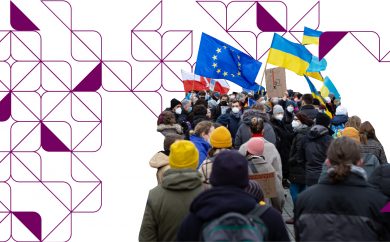In Kharkiv, 2% of citizens are actively engaged with civil society organizations. Despite the existing potential, 91% of citizens have never contributed to CSOs financially. Lack of interest is a major reported obstacle to active participation in civic initiatives. 75% of respondents mistakenly believe that local authorities should authorize holding of a peaceful assembly, and less than half of Kharkiv residents know that a rally can be prohibited when other people’s rights are at stake.
Pact presents these and other key findings of the National Civic Engagement Poll, conducted in summer 2021 under the USAID/ENGAGE Activity. Since 2019, Pact has been biannually collecting additional data under the poll from its four target oblasts – Kharkiv, Zaporizhzhia, Sumy, and Kherson.
The Latest Wave of the Civic Engagement Poll
Civic Engagement: Local Communities Drive Activism, Lack of Interest is Major Obstacle
Kharkiv residents are more engaged in the lives of their communities than in the activities of CSOs. 2% of the respondents regularly attend meetings and other public events in their communities and 24% do it rarely. 38% report that they are not interested, while 35% do not have time for such activities. When it comes to engagement with CSOs, 2% of respondents claim that they actively participated in their work while 14% joined rarely. The lack of interest is the major obstacle to participating in the CSO-led events for 52% of Kharkiv citizens, while another 32% indicate the lack of time.
Similar to the national polling results, Kharkiv residents are aware of various forms of democratic participation. However, this knowledge is not converted into action. The activity rates reported by respondents are below the margin of error both for community-level forms of engagement and the issues of national importance. For example, 4% of respondents participated in peaceful assemblies for a specific cause, 3% were engaged in the creation or work of a housing, street, or block committee. 3% reported on a damaged road or other infrastructural issues to a local administration, while less than 1% filed reports on corruption to the Prosecutor’s office or police.
Citizen Donations: Contradictions Override Motivations to Provide Financial Support to Civic Initiatives
The Kharkiv oblast findings suggest that donating to CSOs is not a priority for citizens. 91% have never donated to the activities of civil society organizations. The majority of respondents vest responsibility for financing CSOs in rich people (57%) and businesses (54%). At the same time, 44% of Kharkiv oblast residents opine that funding civil initiatives are a duty for the citizens who such initiatives represent. The share of those who believe the state should be responsible for such funding is 32%.
Almost one-third of respondents (34%) are convinced that nothing would make them invest in civic initiatives. However, citizens name transparent management of funding (26%), clear goals, and results of the civil initiative (25%) as the most important factors that can potentially influence their decision to donate. On the other hand, knowing someone who already benefited from the results from this civil initiative (23%) and extensive publicity (20%) top the list of the least convincing factors. At the same time, respondents demonstrate certain inconsistencies while talking about their motivations to financially provide for CSOs. While a cause that the civil initiative supports was ranked third in the list of top motivating factors (22%), 17% of respondents find it discouraging.
Nevertheless, a certain culture of individual giving is innate to Kharkiv respondents. Most often residents of the oblast gave money to the beggars in the streets (44%), donated to the church (41%) and army (26%).
Attitude toward Reforms: Citizens Associate Personal Issues with Major Problems of the Region, Uncertainty About Reform Effects Prevails
The Kharkiv oblast respondents consider poverty (32%), pension (23%), and unemployment (22%) to be the most pressing issues for the state. These findings slightly differ from the opinion of most Ukrainians who put corruption (50%), the crisis in the Donbass (42%), and poverty (37%) on top of the list. On a personal level, the Kharkiv data mirrors the result of the national polling: poverty (33% vs 47% in Ukraine), unemployment (25% vs 34%), and access to healthcare (25% vs 36%) are the main concerns of the respondents. According to the respondents, the oblast is facing the same problems – poverty (37%), unemployment (31%), and access to healthcare (25%) top the list.
Local attitudes and expectations of reforms are quite similar to the opinion of Ukrainians in general. 28% of respondents felt negative consequences of reforms (24% in Ukraine), and 3% noticed positive changes (2% in Ukraine). Like most Ukrainians, Kharkiv oblast respondents are quite uncertain about when they can experience the outcomes of reforms. While 22% of respondents expect reforms to happen in more than 10 years (18% in Ukraine), 20% hope to see the results of reforms in 2-3 years (14% in Ukraine). The biggest share (28%) – almost the same as in Ukraine (29%) – had difficulties with assessing their expectations.
Talking of corruption, opinions of the Kharkiv residents are generally in line with those voiced by most Ukrainians. Fewer respondents believe that bribery is an integral part of the Ukrainian mentality (48% vs 59% in Ukraine). An absolute majority of Kharkiv residents (93%) agree that corrupt officials should be removed from offices (Ukraine – 91%). At the same time, 64% believe that if one can resolve an issue with a public servant by using a reward, most people will do so (Ukraine – 66%). Although 70% note that anyone who offers a bribe must bear the same responsibility as the one who takes it, 46% of respondents are convinced that they will not get proper access to healthcare or higher education unless they pay a bribe (65% and 49% in Ukraine, respectively).
Civic Literacy: Aware of Local Authorities Mandate, Puzzled with Peaceful Assembly Authorization
Most Kharkiv citizens are generally aware of their fundamental rights, the structure of power, and the principles of how it’s formed. However, Kharkiv citizens followed the nationwide trend and failed to answer the questions on the income tax rate (28% of correct answers in the oblast vs 41% nationwide) and local executive bodies (29% vs 25%).
The biggest challenge for Kharkiv citizens was the question regarding authorization to hold a peaceful assembly. 75% believe that local authorities should authorize holding a peaceful assembly or a demonstration (62% in Ukraine). Accordingly, less than half of Kharkiv respondents know that a rally can be prohibited when other people’s rights are at stake (44% vs 48% in Ukraine).
________________________________________
This survey summary was prepared by Pact as part of the USAID/ENGAGE activity, which is funded by the United States Agency for International Development (USAID). The contents of this survey summary are the sole responsibility of Pact and do not necessarily reflect the views of USAID or the United States Government.
About the CEP
The Civic Engagement Poll is conducted under the framework of the Enhance Non-Governmental Actors and Grassroots Engagement activity (USAID/ENGAGE), implemented by Pact. This report summarizes key takeaways from the poll, drawing from survey data collected in the autumn of 2021.
The survey gauges citizen awareness of and engagement in civil society activities, and citizens’ participation in and perception of reform processes in Ukraine. During the most recent survey, respondents were also asked questions on the fundamentals of state functioning, human rights, and financial literacy.
The data collection for the USAID/ENGAGE Civic Engagement Poll was conducted by the research agency Info Sapiens, in August – September of 2021. Field interviews were conducted with Ukrainian residents aged 18 years and older, face-to-face, in the respondents’ homes. The survey sampled 302 respondents and was designed in accordance with the distribution of the adult population of the Kharkiv oblast by age, sex, and settlement type according to the data of the State Statistics Service of Ukraine as of January 1, 2019. The margin of error of the sample is 5.7% (excluding the design effect).
Find more results from the Civic Engagement Poll:
Winter 2021 Summer 2020 Winter 2020 Summer 2019 Winter 2019 Summer 2018 Winter 2018 Autumn 2017
You can download survey data and charts here.


